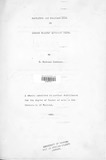| dc.description.abstract | In this thesis we will be concerned with the
examination of deviation and foregrounding in three
literary texts: Asali Chungu, a prose text by Said
Ahmed Mohammed, Swifa Ya Nguvumali, a poem by Hassan
bin Ismail, and a play, Wakati Ukuta by Ebrahim Hussein.
We are defining deviation as the violation of the
established rules and conventions of the language.
Foregrounding, on the other hand is the deliberate
manipulation of the language for the purpose of highlighting
and emphasizing a message in a piece of literary
text. Ultimately, the two terms are merged with
foregrounding being considered as a general term and
deviation an important sub-variety of the former.
Studies on foregrounding, to quote Mukarovsky
(Freeman ed. 1970:40), "have sought to establish what
methods a writer of poetry or prose uses to make
particularly prominent - more prominent than in ordinary
non-literary language - certain aspects of texture in
a given literary work." Whereas our approach does not
very much deviate from this view, our focus of attention
and emphasis will be on the effects produced by the
features in question 'and how they enable the reader to
understand a particular text. In other words we
hypothesize that whenever a writer employs a deviant
or foregrounded feature, it enables the reader to g in
iv
a deeper understanding of the text he is reading,
enabling him to perceive it in a better way. Deviant
and foregrounded features have, above everything else,
a communicative role and are therefore treated as
devices through which a writer puts across a literary
message to the reader. According to this view,
deviation and foregrounding are treated as a bridge
between the form and content in a piece of literary
writing.
The thesis, besides the introduction, has been
divided into four chapters as shown below:
The introduction discusses the statement of the
research problem, aims and objectives, hypothesis,
rationale and the scope of study. It also discusses
the concepts of deviation, foregrounding and norm.
Finally it discusses the theoretical framework and
methodology for the thesis.
Chapter One discusses the effects of deviation and
foregrounding in the prose text Asali Chungu.
Chapter Two discusses the effects of deviation
and fore grounding in the poem Swifa Ya Nguvumali.
Chapter Three discusses the effects of deviation
and foregrounding in the play Wakati Ukuta.
Chapter Four is the conclusion for the thesis | en |

